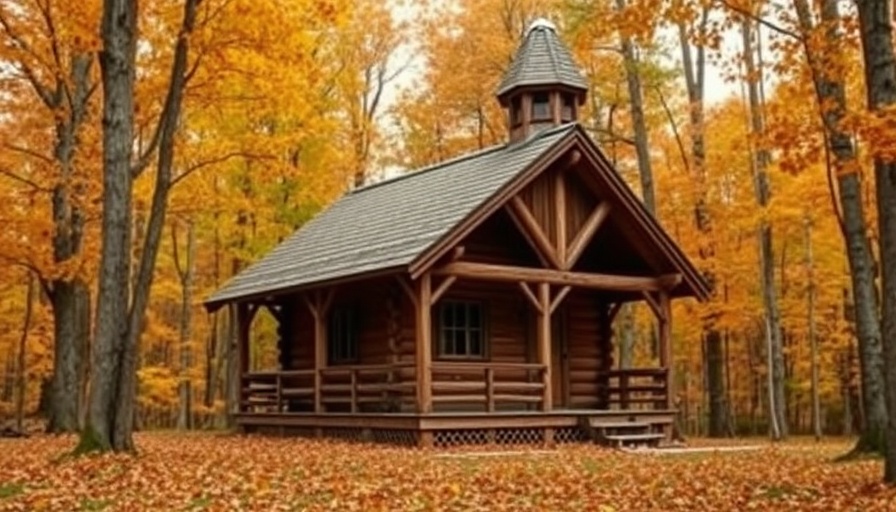
Understanding the Allure of Off-Grid Living
Living off the grid presents a unique appeal for those seeking a more self-sufficient and sustainable lifestyle. This means eschewing conventional public utilities, relying instead on personal resources for energy, water, and waste disposal. But what does it truly mean to disconnect from modern conveniences?
For many, the thought of stepping away from the hustle and bustle of urban life toward a more tranquil existence in nature is invigorating. It provides a chance to reconnect with the environment and cultivate skills that seem to be fading in our tech-centric world. However, this journey requires a well-considered approach.
Become Knowledgeable Before You Leap
Before taking the plunge into off-grid living, extensive research is imperative. Equip yourself with knowledge about local wildlife, weather patterns, and survival skills. Understanding the nuances of your environment—like the area's climate and resources—is crucial for long-term success. Knowledge is your first tool; without it, you might find yourself unequipped to face the inevitable challenges that arise.
The journey toward self-sufficiency is much more than just a change of address; it requires a mindset shift and a commitment to learning. Resources like books, blogs, and workshops can provide insight into best practices for off-grid living.
Choosing the Perfect Location
Location is everything when it comes to off-grid living. Evaluating the region's weather, soil quality, and availability of natural resources is key. A site with fertile land for planting and a reliable rainfall can maximize your chances of sustaining crops and maintaining a healthy lifestyle.
Consider the seasonal weather patterns. Do you have the right conditions to grow a garden year-round? The right climate not only supports gardening but affects everything from heating your home to sourcing water effectively.
Multiple Energy Sources Are Essential
Relying on a singular energy source can spell disaster in off-grid living. Diversifying your energy options—such as solar, wind, or hydroelectric systems—ensures you have access to power even when one source falters. For instance, solar panels are an incredibly effective option for harnessing energy—especially in sunny regions.
However, when solar power isn’t viable due to weather conditions, wind generators and backup generators can step in. Investing in good quality and reliable equipment will pay off when the clouds hide the sun for days.
The Lifeline: A Reliable Water Source
Water is a critical resource for survival, be it for drinking, cooking, or irrigation. In off-grid living, securing a dependable water source is paramount. Techniques such as rainwater harvesting can mitigate reliance on nearby rivers, which may run dry in droughts.
Moreover, learning about purification methods is crucial. Contaminated water can lead to serious health issues, emphasizing the need for systems to ensure your water is safe for consumption.
Practical Tips for Sustainable Off-Grid Living
Incorporating sustainable practices into your off-grid lifestyle not only enhances your self-sufficiency but also helps in preserving the environment. Here are a few essential strategies:
- Embrace Gardening: Growing your own food through techniques like urban gardening, vertical gardening, or even hydroponics can substantially cut costs while promoting self-sustainability.
- Utilize Composting: Composting organic waste not only reduces landfill contributions but also enriches your garden soil, fostering plant growth.
- Incorporate Renewable Resources: Explore methods like rooftop farming or community gardens as ways to diversify your ability to produce food.
Common Myths About Off-Grid Living
Despite its charm, several misconceptions about off-grid living often deter potential adopters. Many believe that off-grid living equals isolation, but in reality, it can necessitate a stronger community connection than urban life. Community support plays a vital role, whether through local farming initiatives, cooperative buying groups, or skill-sharing networks.
Additionally, there’s a myth that off-grid living is only feasible for the wealthy. While initial investments in renewable resources can be high, many options exist for frugal yet effective setups.
Taking the Leap
The transition to off-grid living is not without its challenges, but the rewards can be profound. Picture waking up to the sounds of nature, knowing your choices contribute to a healthier planet and community. Take a moment to consider the value of independence, sustainability, and connection to nature in your life.
As you ponder the transition, remember that it starts with knowledge, a supportive community, and a passion for sustainable living. The journey may not happen overnight, but the steps you take today can pave the way for a fruitful life off the grid.
 Add Row
Add Row  Add
Add 




 Add Row
Add Row  Add
Add 

Write A Comment